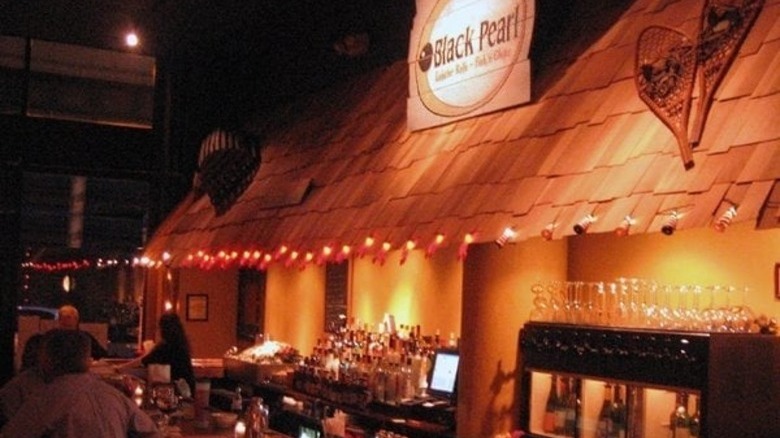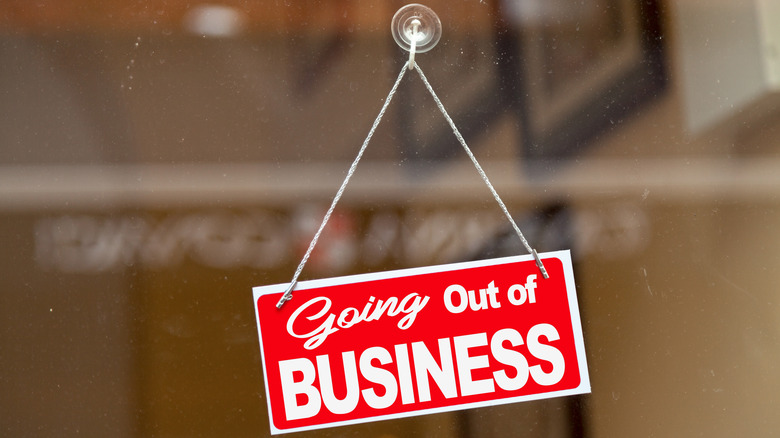Whatever Happened To The Black Pearl After Kitchen Nightmares?
It's been said that any publicity is good publicity, but nothing quite pushes this wisdom to its limit like "Kitchen Nightmares." Appearing on an internationally televised show provides small businesses a level of advertising they could never achieve by their own means, but on the flip side, you can rest assured that those business owners are going to come off as ill-tempered oafs who couldn't run a bath, much less a restaurant. Plus, appearing on any Gordon Ramsay program means being used as fodder for the chef to fill his swear jar.
"Kitchen Nightmares" has a controversial history, accused of fabricating drama on multiple occasions. Producers have intentionally overbooked restaurants and pressured businesses into hiring incompetent chefs, and one restaurant even sued Ramsay, accusing him of faking vomiting over its food. Despite that, it's arguable that no restaurateurs hold more animosity toward the celebrity chef than the owners of the Manhattan seafood joint The Black Pearl. The restaurant appeared in season 2, episode 5 of "Kitchen Nightmares." Four days after airing, it permanently closed. In the aftermath, its trio of owners unleashed a barrage of insults on Ramsay, blaming him for their failure.
"Kitchen Nightmares" was canceled in 2014, but the series is slated to return on September 25, 2023, exactly 15 years after the Black Pearl episode aired. To mark the occasion, let's see what went wrong with the eatery and how it compares to other businesses featured on the show.
Ramsay couldn't do much for The Black Pearl
The Black Pearl's problems hinged on the tense relationship between its three owners: David, Brian, and Greg. At the episode's outset, the trio are not on speaking terms, communicating only via text and email. In an attempt to restore order to the establishment, Ramsay forces the owners to be onsite simultaneously, assessing their strengths and weaknesses. While David resists every move Ramsay makes, the other two go along, and in typical "Kitchen Nightmares" fashion, an interior design makeover and Ramsay-revamped menu seem to save the day in the end. The apparent happy ending, however, was short-lived.
Gordon couldn't keep The Black Pearl in business, but he managed to reunite the three feuding owners. Unfortunately, the thing that brought them together was a burning hatred for the British chef. In a letter published by Eater, David, Brian, and Greg excoriated the host, claiming that "The changes Gordy Ramsay made were ridiculed by the press, hated by our regular customers and were the direct cause of a 50% drop in revenues."
They accuse the show's editors of cutting the episode to make them look bad and reveal that the diners who filled the restaurant at the show's end were all hired actors instructed to order only menu items Ramsay created. The most vicious line in the letter reads, "I hope Gordo meets an untimely death so that I can dance on his grave."
Kitchen Nightmares has a pretty low success rate
The letter from The Black Pearl's owners represents a rare instance of Gordon Ramsay being on the receiving end of a derogatory barrage. Still, the restaurant's fate is anything but uncommon. The original 2007-2014 "Kitchen Nightmares" run profiled 77 restaurants in total. As of the writing of this article, only 12 are still open for business. Notably, every restaurant showcased in the first two seasons, including The Black Pearl, is now closed. However, it isn't necessarily that Ramsay failed to save these businesses.
While many restaurants from "Kitchen Nightmares" did close within a year of their episode airing, some stayed in business for much longer, ultimately closing for other reasons. For instance, Cafe Hon and Mama Maria's, which both appeared on the show in 2012, survived for ten more years before their owners retired. In other cases, the businesses failed for reasons beyond Ramsay's control. He certainly can't be blamed for Bella Luna Kitchen illegally selling alcohol.
The restaurants seen on "Kitchen Nightmares" are notable for their frequently outrageous ownership, but their fates aren't that uncommon. A study conducted by economists from U.C. Berkeley and the U.S. Bureau of Labor Statistics found that the average lifespan of a restaurant is just four and a half years. Many establishments seen on "Kitchen Nightmares" passed this mark either before or after their episode. What's shocking is that this rate is actually slightly higher than other businesses in the service industry.


